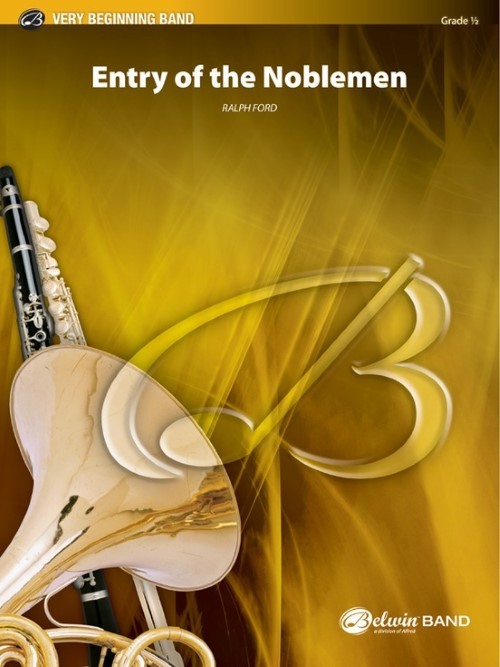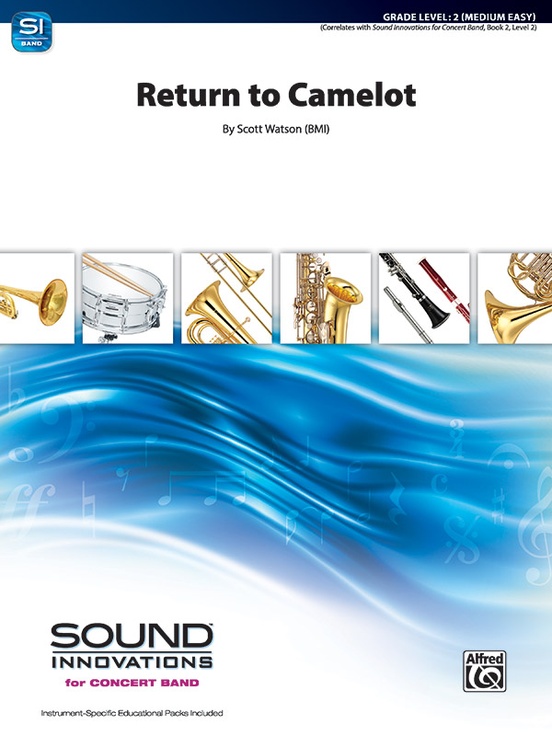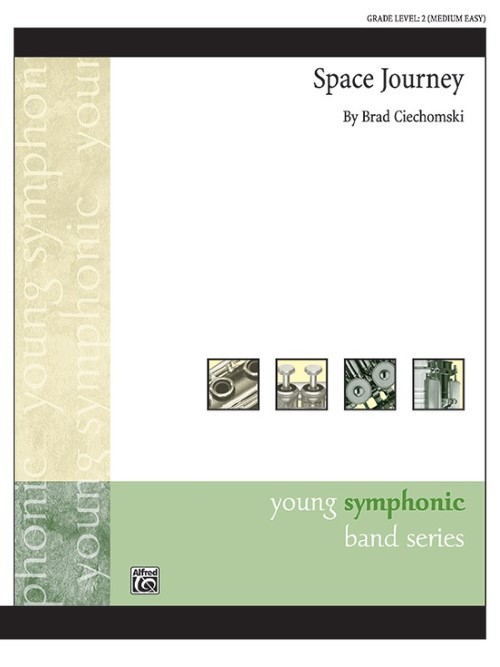Results
-
 £50.50
£50.50Entry of the Noblemen (Concert Band - Score and Parts) - Ford, Ralph
Proudly the valiant royal knights return to the kingdom. This original work begins and ends with a grand march encompassing an expressive chorale section. The contrasts permit varied teaching opportunities, including breath support, diverse dynamics, and opposing styles and articulations. An impressive choice for your first presentation. Duration: 2.15
Estimated dispatch 7-14 working days
-
 £71.50
£71.50When The Knights Return From Battle - Darren W. Jenkins
When the Knights Return From Battle represents knights from medieval times processing through the lands that they have sworn to serve and protect. An opening fanfare announces their patrol of the countryside where they encounter an enemy force, determined to invade and conquer. A fierce battle ensues in which the knights vanquish their enemy and make their triumphant return home victorious once again.
Estimated dispatch 7-14 working days
-
£109.99
Return to Neverland
Return to Neverland is a selection of melodies from the film of the same name, which was inspired by the timeless book by J J Barrie. This skilful arrangement interweaves fragments of the main melodies to make a fun and exciting work for concert band.
Estimated dispatch 7-14 working days
-
 £53.95
£53.95Return to Camelot (Concert Band - Score and Parts) - Watson, Scott
Camelot refers to an idyllic time and place, lost to lore and legend, but which continues on in the hearts, minds, and stories of so many. When our imagination and sense of adventure allow it, we return to Camelot, with its gallant knights of the Round Table, acts of chivalry, and even moments of magic! This exciting piece by Scott Watson, with its driving tempo, insistent rhythms, modal harmonies, and glimpses of beauty, musically transports the listener back to King Arthur's Camelot. Duration: 3.30
Estimated dispatch 7-14 working days
-
 £109.99
£109.99Return to Neverland (Concert Band - Score and Parts)
Return to Neverland is a selection of melodies from the film of the same name, which was inspired by the timeless book by J J Barrie. This skilful arrangement interweaves fragments of the main melodies to make a fun and exciting work for concert band. 0:08:00
Estimated dispatch 7-14 working days
-
 £59.95
£59.95Flaming Arrow - Larry Clark
With a pronounced Native American flavor, this characteristically well-wrought Larry Clark piece alternates slow reflective music with an aggressive Allegro that includes rhythmic shouting and stamping. The return of the slow opening music at measure 35 leads to an accelerando and crescendo into the climactic return of the Allegro material and the exciting conclusion that may have the audience stamping and shouting!
Estimated dispatch 7-14 working days
-
 £56.50
£56.50Space Journey (Concert Band - Score and Parts) - Ciechomski, Brad
Space Journey is a three-movement suite depicting the launch, orbit and return to earth of a spaceship. Blast Off Into Orbit begins with a dramatic launch portraying the spaceship powering into the atmosphere. Zero Gravity allows the listener to float in space as a Lydian melody in the flute provides a light, weightless feeling while the percussion accompanies on metallic instruments. Re-entry to Earth features a descending fanfare announcing the return of the ship through the atmosphere back to earth. The ceremonial theme depicts the spaceship breaking through the sky, and landing in full glory.Duration: 5.00
Estimated dispatch 7-14 working days
-
 £138.00
£138.00San Pedro de Alcntara - Valdemar Gomes
The Spanish war galleon with 64 cannons, built in Cuba between 1770 and 1771 for an English shipowner in the service of the King of Spain left Peru for Cadiz in 1784 with a huge cargo of copper, gold, silver and other valuables on board. There were also more than 400 people on board, including passengers, crew and Inca prisoners after a revolt. The Atlantic crossing went smoothly, passing Portugal to take advantage of favourable winds. The shipwreck off Peniche was the result of human error, apparently due to French maps with dramatic errors in the position of the islands of Berlengas and neighbouring islets. On 2 February 1786, the sea was calm and the night clear, but they hit the rock formation Papoa and the hull immediately broke in two. The bottom sank quickly, while the deck remained afloat for some time. 128 people lost their lives, including many Indians who were trapped in the basement. This shipwreck is considered one of the most important in maritime history.What the composer wants to convey, and what can be felt as one listens, is first of all the sound of power, of hope, of the glory of conquest, of the splendour of wealth. This is followed by the perception of the maritime environment, the harmony with the softness of the ocean, the gliding of the hull in the foam of the sea on sunny, blue days. But along with this tranquillity, you soon hear a rhythmic chain that makes you feel a representation of the hustle and bustle, of the busy crew, of the hard work of a sailor, of the desperation of an exotic people imprisoned in a dark, damp cellar. A distinct rhythm that reminds us of the "salero" of Andalusia, with its Arab influences and its people, the soothing of the resignation of others who are forced to submit. Then we clearly hear a crescendo that makes us imagine the agony of the collision that precedes the shipwreck. The breaking of the hull, the water flooding everything, the despair, the clash of bodies on the rocks, the tragedy to come. Before the "grand finale", in which the return of musical softness reminds us that the story is over. The supremacy of nature over human greed. The waves, though gentle, sweep the wreckage, the lives and the treasures of the New World to the bottom of the sea.
Estimated dispatch 7-14 working days
-
 £154.99
£154.99The Robber Knight - Rob Goorhuis
In the year 1368 a rapacious character takes up residence in the castle of Rijnesteyn at Cothen. He is Johan,bastard son of the Bishop of Utrecht.Round this now so peaceful castle eventful matters are enacted. In part one Johan and Willem Gulik of Guelders set out to do battle against King Charles of France. On their return,in part two, Johan captures two French goldsmiths in Hainault and incarcerates them at Castle Rijnesteyn. Part three is a musical representation of a courtly ballet in medieval style. The final part relates how Jan van Rijnesteyn goes to war against Hendrik van Vianen and Lord of 'Goy,Viscount of Utrecht.Jan loots hispossessions and threathens to conquer all. In het jaar 1368 betrekt een roofzuchtig heerschap het kasteel Reijnestein te Cothen.Het is Johan, de bastaardzoon van de Utrechtse bisschop. Rond dit nu zo vredig gelegen ridderslot hebben zich toen geruchtmakende taferelen afgespeeld. In het eerste deel trekt Johan met Willem Gullik, de hertog van Gelre, ten strijde tegen koning Karel van Frankrijk. De terugreis speelt zich af in het tweede deel. Tijdens deze reis neemt Johan in Henegouwen twee Franse goudsmeden gevangen en sluit ze op in de kerker van slot Rijnesteyn. Deel 3 is de muzikale weergave van een hoofs ballet in middeleeuwse stijl. In het laatste deel wordt verteld hoe Jan van Rijnesteyn in 1396 ten strijde trekt tegen Hendrik van Vianen en de heer van't Goy, burggraaf van Utrecht. Jan plundert diens goederen en dreigt diens bezittingen te veroveren.
Estimated dispatch 7-14 working days
-
 £292.00
£292.00Marco Polo (French text) - Antonio Rossi
Marco Polo (Venice, 1254), son of Venetian merchants, left in 1271 with his father Niccol and his uncle Matteo, towards the distant China at the court of the Mongol emperor Kublai Khan. The long journey, which lasted three and a half years, led the Polos to cross Turkey, Central Asia, the Pamir, and the Gobi desert. The intelligence of the young Marco and his curiosity towards new customs and languages raises the interest of the emperor so much that he decides to keep him at his court by appointing him ambassador. This assignment takes him to newly conquered southern China and other parts of southern Asia. In 1292, the Great Kublai Khan agrees, albeit reluctantly, to let him go.Marco, after 17 years at his service, can finally return to Venice, but not before completing a last mission for the Grand Khan: accompanying his niece, Princess Kokachin, to Persia, where she would marry. A few years after his arrival in Venice, Marco finds himself involved in a naval battle against the Genoese people in which the Venetians are defeated. Consequently, Marco is captured and taken to prison in Genoa. There, he meets the storyteller Rustichello da Pisa to whom he tells the story of his adventurous journey. After his release, Marco returned to Venice and led a comfortable life until his death in 1324.
Estimated dispatch 7-14 working days
